Could a white woman ever be elected South Africa's president?
- Published
- comments
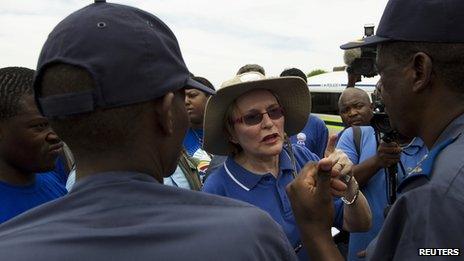
Helen Zille treads a narrow path. She's a white woman, leading the main opposition party, against a former African liberation movement, in what you might call a "developing democracy".
In many countries, the leader of the opposition can afford to rail and spin and generally throw mud at the ruling party without too much caution, while those in charge of running the government are held more firmly to account.
Here in South Africa the opposite often seems to hold true.
Ms Zille's race is, she concedes, "a powerful factor" that is routinely used against her by elements in the governing African National Congress (ANC), and which many observers have identified as a stumbling block in the opposition Democratic Alliance's (DA) relentless ambition to take power.
So, it's no surprise to find that in person, Helen Zille, 61, speaks with the precise, careful delivery of a lawyer summing up a tricky commercial law case.
Not that she pulls her punches. During the course of our interview, Ms Zille brands the ANC "a mortal threat to our constitution… a racial nationalist party" and "a group of warring fiefdoms" that is "busy imploding".
We meet at her stunning, white-walled official residence in Cape Town. Manicured gardens frame an immaculate view of the city and bay. Ms Zille is premier of Western Cape - the only one of South Africa's nine provinces to slip from the ANC's grip at the 2009 election.
She enters the wood-panelled drawing room fresh from a football cup parade and dressed up, she explains, for an evening date with her husband.
It's been "downhill" for the ANC since 2004, Ms Zille declares, branding the ruling party "a group of… factions all fighting for power for money's sake, to control the patronage networks, control the tenders and contracts and employment committees.
"And once a party feels so immune to public criticism and so certain it's going to be re-elected at every election, that is the moment of critical danger and I think the ANC's unravelling will continue very quickly over the next seven years."
The Democratic Alliance, by contrast, is "on a roll… growing with every national election", with control of 27 municipalities, one province, and "one in four votes" in the last national election.
"We can go on to be the party of national government by 2019," she says with conviction.
Of the political damage caused to the ruling alliance by the killing in August by police of workers at the Marikana platinum mine, Ms Zille says it "will dislodge a boulder from the top of the mountain, and it will roll down and gather momentum and I really do believe it will cause such a tremor that South African politics will look very, very different by the time the 2014 election comes around… The ANC are in for a big shock."
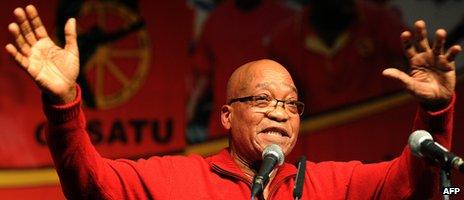
President Zuma is under pressure from many in his own party
In recent years I've certainly noticed the DA's growing presence at a grassroots level in black communities, where local DA councillors are increasingly seen as a credible alternative to the ANC.
But behind the scenes it is no secret that the party is hunting aggressively for a high profile black recruit from the liberation struggle era, who can help demolish the resilient suspicion that the DA remains, fundamentally, a minority party, designed to preserve and protect white economic interests against the pressures of transformation.
Ms Zille can lay claim to her own struggle credentials, and the DA's appeal has already been broadened by the arrival of figures like parliamentary leader Lindiwe Masibuko in their line-up.
But while careful in interviews, Ms Zille can still sometimes shoot herself in the foot with provocative "stunts," like her recent visit to President Jacob Zuma's Nkandla residence, external, which appear to play into the ANC's hands.
Would the ANC accept defeat at a national level? Analysts like Moeletsi Mbeki have told me the party will eventually slink away "with its tail between its legs." Ms Zille sounds confident too, but strikes a note of caution.
"We are in a race against time," she says. "The ANC doesn't believe in separating party and state. President Zuma believes liberation means unfettered power for the ANC."
"The ANC is a mortal threat to our constitution," she continues, focusing on a long-running dispute over the dismissal of corruption charges against Jacob Zuma, and the refusal of the National Prosecuting Authority to comply with a Supreme Court of Appeal ruling to release details of the secret tapes upon which the 2009 dismissal was based.
"It takes time for everyone to understand that if you put the president above the law, then no-one is safe before the law," she says.
Warming to her theme, Ms Zille raises the spectre of a "Zimbabwe-style" outcome, where "institutions of state, the police, army, and electoral commission" become extensions of the ruling party.
"We have to have a transition before that happens, and I think we're well on the way."
- Published29 August 2012
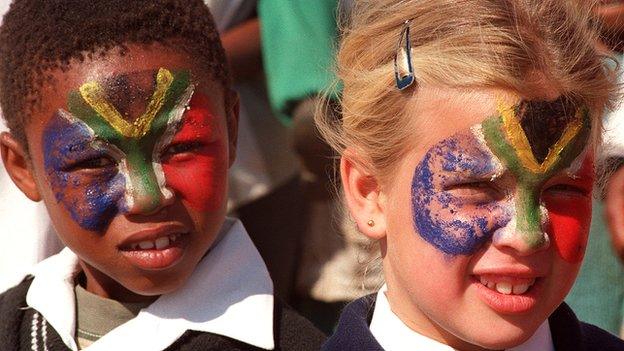
- Published6 April 2018
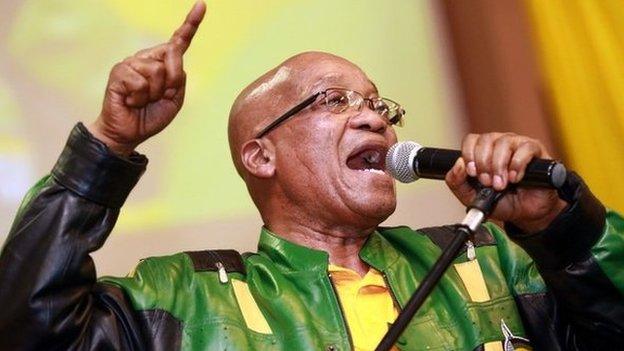
- Published4 October 2012
- Published3 October 2012
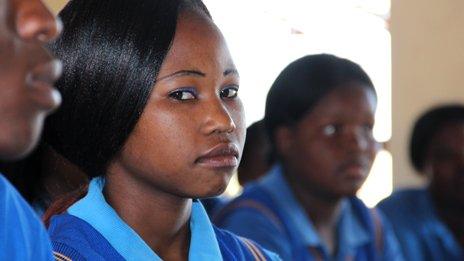
- Published9 July 2024

